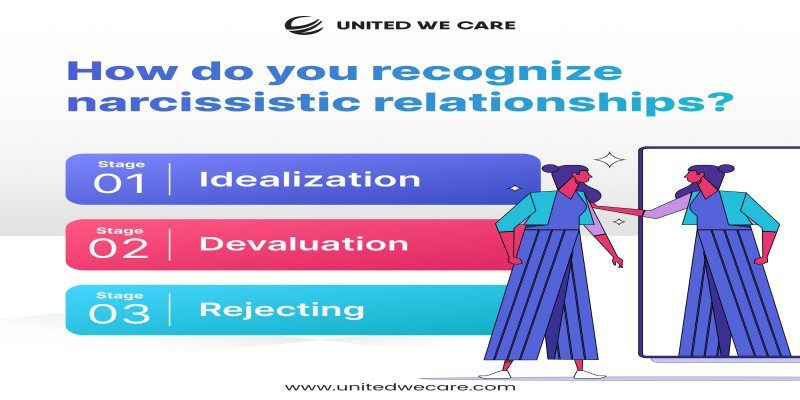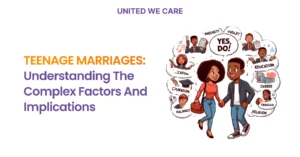Introduction
What happens when we grow up in survival mode and fail to develop a healthy sense of self?
We’re inherently wired to protect ourselves from any kind of danger. Hence, a threat to our sense of self might give rise to a particular coping mechanism: narcissism.
When we’re not fully emotionally developed, our sense of self is so fragile that we often can’t see or consider others. Our ego overcompensates by making our “self” the sole focus.
As adults, narcissistic people tend to exhibit self-centeredness, manipulation, and a lack of empathy.
What are narcissistic relationships?
When narcissistic behavior becomes a pattern, it influences our personal and professional relationships.
Uncooperative, selfish, and abusive—these are the common denominators in all narcissistic relationships.
In a relationship, an unbalanced and toxic equation forms when one person’s needs and emotions take precedence over the others.
A narcissistic person will often:
- Believe they are superior, entitled, and more important than anyone else [1], which can lead to arrogance and condescension.
- Feel they are special and unique and expect favorable treatment or compliance from others.
- Take advantage of others for their personal gain through charm, lies, and emotional manipulation.
- Have an inability or unwillingness to understand the feelings and needs of other people, which can lead to emotional neglect and indifference.
- They require excessive attention, admiration, and validation to bolster their fragile self-esteem.
- Have difficulty forming meaningful connections with others.
Narcissism looks different in different relationships
Narcissistic parents live vicariously through their children. By putting their own emotional needs before their children’s, they create a culture of codependency. Children with narcissistic parents grow up alienated from their own selves. Teen with narcissism show self centredness, manipulative behaviour.
Narcissistic partners may use their partners to gain status or wealth or treat their partners merely like an object to serve their own needs. They may cross boundaries, lie to cover up their behavior and gaslight their partner to shift blame.
Narcissistic colleagues may deliberately take credit for someone else’s work, spread rumors, exploit their coworkers for unpaid help, etc.[2]
How do you recognize narcissistic relationships?
Narcissistic relationships follow a harmful, exploitative cycle. It may be similar to being on a rollercoaster ride: immense highs one minute and extreme lows the next.
During this cycle, we find the narcissist idealizing, devaluing, and rejecting the victim.

Stage 1: Idealization
This is the “hook” of the relationship. The narcissist showers the victim with excessive attention and admiration. They put them on a pedestal, making them feel as if they are perfect and can do no wrong.
Slowly, the victim begins putting their guard down. They may even overlook some “red flags” because of how enamored they feel otherwise.
During this stage, the grandiose gestures, love-bombing, lack of boundaries, and quick connection may feel intense and overwhelming.
Stage 2: Devaluation
First, they build up the pedestal; then, they slowly remove the victim from it. Through criticism, they make them feel insecure, devalued, and even worthless.
Comparison to others, passive-aggressiveness, physical or verbal abuse, stonewalling, etc., can be major markers of this stage.
Intentionally distorting the truth to instill self-doubt in the victim, aka gaslighting [3], is also widely experienced during this stage.
Stage 3: Rejecting
The narcissist may discard the victim once they’ve had their fill of ego-boosting in the relationship. They will place all the blame for the relationship’s downfall on the victim.
They may express rage or even play the victim themselves. Even worse, they might try to hoover them back to recover the control they once had.
Impacts of narcissistic relationships
A narcissistic relationship can have severe negative effects on a victim’s mental, emotional, and sometimes physical and financial well-being.
People who are or have been in such a relationship may experience:
- Low self-esteem owing to constant criticism and emotional manipulation. Over time, victims internalize the negative messages, resulting in a sense of inadequacy
- Loss of identity, aspirations, and a sense of purpose as the narcissist overshadows or erases the victim’s individuality [4]
- Anxiety and depression from the stress of dealing with the narcissist’s behavior
- Feelings of loneliness and alienation due to isolation by the narcissist
- Symptoms similar to post-traumatic stress disorder (PTSD), such as intrusive thoughts, flashbacks, hypervigilance, etc.
- Challenges in trusting others and forming new, healthy relationships
- Guilt and shame
- Eating and sleeping issues
How to overcome psychological abuse in narcissistic relationships
When dealing with a narcissistic relationship, the most effective strategy to end the abuse is to walk away.
The decision to continue a narcissistic relationship is challenging and personal, but not all hope is lost if both parties are determined to rebuild it.
Either way, it’s going to be tricky. You can start by acknowledging the abuse and reaffirming to yourself that you’re not to blame.
Then, take some time to reflect, rebuild trust, and reestablish boundaries. [5] This can reaffirm your healing journey and provide you with self-confidence. It can also protect you from future toxic relationships.
Reach out for emotional support from your friends and family. Also, consider therapy to work through the trauma.
Practice self-care in the form of exercise, meditation, and mindfulness to nurture yourself.
Reevaluate and establish new personal and professional goals to help you regain a sense of purpose in your life.
And most of all, be patient with yourself and the process.
In conclusion
Narcissistic relationships are deeply damaging. Complex trauma in childhood can lead to a never-ending cycle of narcissistic abuse later in life.
We can find narcissistic relationships within families, with romantic partners, as well as at work. They all follow the same cycle of idealization, devaluation, and rejection of the victim.
A narcissistic relationship can have severe negative effects on the mental, emotional, physical, and financial well-being of the victim.
The decision to continue being a part of a narcissistic relationship is personal and complex; however, it’s best to distance oneself and end it.
Taking some time out for yourself to truly heal, practicing self-care, building your emotional support system, and reevaluating life goals can significantly help you bounce back from narcissistic relationships.
If you find similar signs in yourself or a loved one , you need to reach out for professional support. The United We Care app can be a useful resource in getting suitable support.
References:
[1] “Narcissistic Personality Disorder,” APA Dictionary of Psychology, American Psychological Association, https://dictionary.apa.org/narcissistic-personality-disorder. [Accessed: September 25, 2023].
[2] Zawn Villines, “Example of Narcissistic Behavior,” Medical News Today, https://www.medicalnewstoday.com/articles/example-of-narcissistic-behavior#at-work. [Accessed: September 25, 2023].
[3] Silvi Saxena, MSW, CCTP, “Narcissistic Abuse Cycle,” Choosing Therapy, https://www.choosingtherapy.com/narcissistic-abuse-cycle/. [Accessed: September 25, 2023].
[4] Arlin Cuncic, MA, “Effects of Narcissistic Abuse,” Verywell Mind, https://www.verywellmind.com/effects-of-narcissistic-abuse-5208164. [Accessed: September 25, 2023].
[5] Annia Raja, PhD, “Narcissistic Relationship Pattern,” MindBodyGreen, https://www.mindbodygreen.com/articles/narcissistic-relationship-pattern. [Accessed: September 25, 2023].









